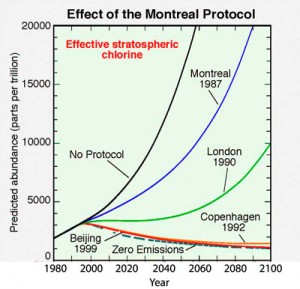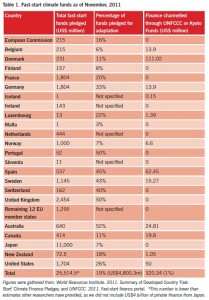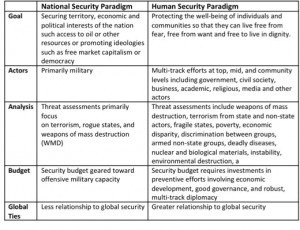International relations paradigms exist to provide of a framework to begin to understand the way in which the world functions.[1] Claims made from those who think along a certain paradigm generally will clash with the claims or beliefs of another. For instance, realists claim that cooperative global responses to the global environmental crisis that is currently bearing down upon our society and the planet are not possible, given the human track record for working alongside cultures different from our own. Thomas Hobbes, a 17th Century political philosopher, attributed this inability to work together to the lack of a “common power” that would “keep all in awe.”[2] This common power or common law has not been seen throughout the course of human history; different sovereign states have had their own common law, but have constantly come into contact with groups of others who do not share their same beliefs. This has for the majority of human history led to war and conquest, slavery and cultural destruction. Without a common law, there is only “man against every man.”[3] Hobbes was right in his claim. How can cultures with completely opposing ideological beliefs live alongside one another without some sort of conflict? They could come together and put aside their differences and work together on building a sustainable society. This is the sentiment most of us are taught at a young age while going through grade school in the United States. However in the globalized world we now find ourselves, this type of collaborative effort has not been seen. I think this has in part been due to a lack of what Hobbes was referring to as the common power. Unlike the realists I think that global climate change, the common power to keep us in awe to allow cooperative efforts based around one subject, will lead to and has been leading to global cooperative response. This is because global climatic change does not carry a flag different from your own, it does not speak a different human tongue, it does not infringe upon national security, it is a threat to the very existence of our globalized human society. It is for this reason that I think the paradigms that oppose the realists, liberalism and constructivism, offer solutions to the threat that protect “human security” instead of simply “national security.”[4]
Liberalism and constructivism both stem from the utopian-themed idealism paradigm. They do share the same key factor, peace on a global scale, but use different methods to achieve this. This could be where splits in international climate change agreements and negotiations are seen, such as with the differing opinions on whether or not legally binding agreements for emissions reductions are the solution. Both legally and non-legally binding documents have begun to appear on different scales within the global theater. The Montreal Protocol was one legally binding document that helped bring our species away from being burned up by intense UV radiation. The Kyoto Protocol is one legally binding document that appears to have led to emissions reductions for its signatories that decided to ratify, and for those that did not ratify reductions were not seen. On the other hand the recent Cancun Agreements are an example of progress towards emissions reductions without legally binding agreements.

The Montreal Protocol is a legally binding agreement to completely phase out- not just reduce- ozone damaging chlorofluorocarbons (CFCs). It was the result of a previous framework decision laid out in the Vienna Convention for the Protection of the Ozone Layer in 1985. Former UN Secretary-General Kofi Annan referred to it as “perhaps the most successful environmental treaty to date.”[5] Its impact can be seen today as CFC concentrations continue to decrease through this century.[6] The Kyoto Protocol is a similar legally binding agreement that is not meant to address ozone damaging gases, but rather human emissions of greenhouse gasses that are responsible for global warming trends. The Kyoto Protocol was not as successful as the Montreal Protocol.[7] Unlike the Montreal Protocol not every signatory nation-state, including the US, ratified the Kyoto Protocol in the end and this led to it being seen largely as a failure. However, for the countries that did ratify the agreement, total emissions reductions were met. Had the United States ratified the agreement it would have been seen as significantly more successful. This is a piece of evidence for the realist theory that cooperative response is not possible and negotiations will end in a nation-state choosing to protect itself before those outside of its borders. In this situation the US acted in favor of national security, not wanting to risk damaging the US economy simply in the name of reducing GHG emissions.

That was around the turn of the millennia and now it would seem that the common power that Hobbes wrote of is being felt and seen across the globe. The threat of climate change is no longer some prediction, it is here, and the earth is fundamentally different.[8] For this, collaborative efforts based around this notion of “human security” before “national security” has been on the rise. In 2010 the UN Climate Change Conference was held in Cancun, Mexico. During this, the 16th Conference of the Parties, a non-legally binding agreement was formed and became known as the Cancun Agreements. It established a fund to assist poorer countries in financing emissions reductions and adaptation. It was expected to grow to $100 billion by the year 2020. While the Cancun Agreement has received criticism for its inability to expressly state how the funds will be used, it was surely a positive step towards reducing emissions- especially when compared to the failure in Copenhagen the year before.[9] These non-legally binding agreements are surely representative of a shift in thinking. After Copenhagen many nations must have felt the pressure to ensure some sort of deal be made so that progress could continue to build.
While these examples are not nearly of the scale needed to shift the warming trends currently being seen, they are a start. And while no change in emissions has resulted from one nation standing up and saying that they would be willing to do whatever it takes to help halt emissions now and adapt to shifting climates, that does not mean it is not yet to come. While betting on that happening is not the safest decision, it would appear that the trend for cooperation is beginning to emerge. This year’s decisive COP and next year’s will surely be a time for the “cooperation trend line” to shift up starkly if we are to begin to curb emissions and limit climate change’s impact on human health and security.
Works Cited
The Economist Newspaper. “Atmospheric pressure.” The Economist. http://www.economist.com/node/1715055 (accessed September 10, 2014).
Biello, David . “Dangerous Global Warming Closer Than You Think, Climate Scientists Say.” Scientific American Global RSS. http://www.scientificamerican.com/article/dangerous-climate-change-imminent/ (accessed September 10, 2014).
Bova, Russell. How the world works: a brief survey of international relations. 2nd ed. Boston: Pearson Longman, 2012.
Earth System Research Laboratory. 20 Questions. 2010 Update. Section IV CONTROLLING OZONE-DEPLETING SUBSTANCES Q16. 48-51. http://www.esrl.noaa.gov/csd/assessments/ozone/2010/twentyquestions/Q16.pdf (accessed September 10, 2014).
Rogelj, Joeri, Julia Nabel, Claudine Chen, William Hare, Kathleen Markmann, Malte Meinshausen, Michiel Schaeffer, Kirsten Macey, and Niklas Höhne. “Copenhagen Accord pledges are paltry.” Nature 464, no. 7292 (2010): 1126-1128.
[1] Bova, 27
[2] Thomas Hobbes, 1651
[3] Thomas Hobbes, 1651
[4] Bova, 239
[5] Bova, 247
[6]http://www.esrl.noaa.gov/csd/assessments/ozone/2010/twentyquestions/Q16.pdf
[7]http://www.economist.com/node/1715055 [8]http://www.scientificamerican.com/article/dangerous-climate-change-imminent/[9] Copenhagen Accords pledges are paltry.

